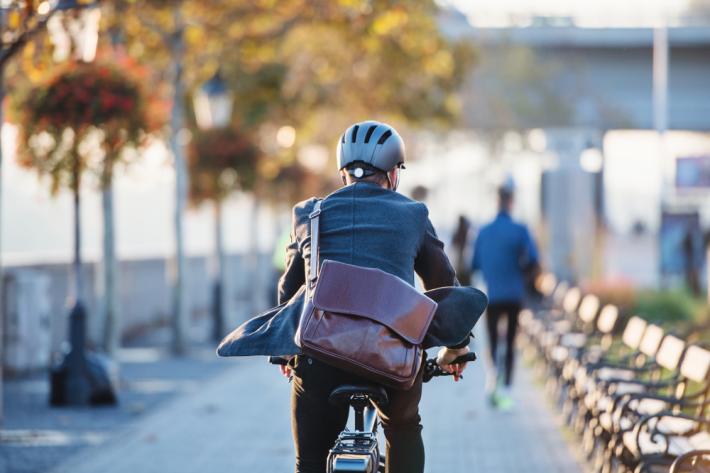Transport

Transport is Scotland’s biggest contributor to climate change and it’s increasingly important for us all to consider how we travel from A to B, and when we can use more environmentally conscious transport options. When planning trips or meet ups with friends and family, or discussing with colleagues your commute to work, starting a conversation about how you travel can help normalise making more planet-friendly decisions when it comes to getting around. This page provides all you need to get those conversations going.

Key information
40% of Scotland’s transport emissions, our biggest contributor to greenhouse gas emissions, comes from cars. During the pandemic, car use reduced dramatically, and many people noticed the benefits of living in quieter, safer and less polluted environments.
Considering over half of all journeys made in Scotland are under 5km, many of these journeys could be taken using active travel like walking, wheeling, or cycling to get around our local areas. Lockdown encouraged the Scottish public to adopt more of these alternative modes of transport, with the number of young people cycling for every day journeys increasing to 39% in 2021 and cycling increasing by 200% generally since lockdown.
For longer journeys, using public transport instead of our own cars can make a significant difference. In fact, one full double decker bus is the equivalent of removing 75 single occupancy cars from Scotland’s roads.
Electric vehicles emit between 17%-30% less greenhouse gas than petrol or diesel cars. It only takes 40 minutes to fully charge an electric car at a cost of £4-£10.

Talking points
We can all make changes to how we travel that will help stop climate change. Spreading the word about these changes can encourage others to form different habits, which can in turn make Scotland a healthier, fairer, greener place to live for us and for future generations. Here are some key talking points to discuss with the people around you.
Reducing car travel
- How often do you use the car?
- Are there any car trips that you think you could avoid? For example, by working from home or using an online service instead?
- Are there times when you could choose a more local destination for your trip, such as for shopping or leisure?
- Could you combine or share your car trip? By combining multiple trips or sharing a car with someone already travelling you can reduce your overall carbon emissions and fuel efficiency.
- What are the barriers preventing you from using your car less and how could these be overcome?
- Can you think of the benefits of using your car less? For example, is there an opportunity to get more physically active, or get to know and support your local community more?
Alternatives to car travel
- How often do you take the car for short journeys?
- Have you thought about, walking, wheeling, cycling or public transport for all or part of your journey, and do you know that there are journey planning tools (Traveline, Citymapper, CycleStreet) that can help you to choose the best route?
- Do you already walk, wheel or cycle for leisure and are there ways that you could start to use these modes for ‘travel’ as well?
- If you’re considering cycling more, have you considered the full range of bikes that could help you to do this, for example, e-cycle, cargo-cycle, folding cycle, and do you know that there is support available to help with these options (eBike Loan Information, Scotland Cycle Repair Scheme, Cycle to Work Scheme)?
- Do you know about concessionary travel schemes, and the way that rail cards can help you get cheaper rail fares?
- What would help you to leave the car at home more? Discuss tips, barriers and share resources.
- Could you make the majority of your trips using a combination of walking, wheeling, cycling and public transport, and consider replacing one or more cars with a club car membership, and have you calculated the money you could save?
Switching to electric
- If you still need to own a private car, would you think about switching to an electric vehicle or plug-in hybrid instead of a petrol or diesel car and do you know about the government support for this?
- Can you think of some benefits for doing so? For example, saving money on fuel and maintenance costs or reducing air and noise pollution.
- Are there other ways you could make the trips that you currently use your car for? An e-cycle or e-cargo cycle may be an option to consider if you need to transport children or other heavy or bulky items. Could a switch to one of these offer additional benefits e.g. from increased physical activity, compared to the benefits of switching to an electric car?
Progress already being made
Transport Scotland, in partnership with COSLA has published a route map setting out the interventions they are putting in place to support people to adopt the four sustainable travel behaviours, including super-fast broadband roll out, supporting ‘20 minute neighbourhoods’ so you have all you need on your doorstep and investment in public transport and car sharing schemes.
We are investing heavily in active travel infrastructure. We have established pilot schemes to provide free bikes for school children who otherwise couldn’t afford one and are introducing safer speed limits in built up areas. We have also introduced low emission zones in four Scottish cities, Edinburgh, Glasgow, Aberdeen and Dundee, to encourage active travel.
In addition to existing concessionary travel for disabled people and over-60s, everyone aged under 22 in Scotland can now benefit from free bus travel by applying here. This will help embed more sustainable travel behaviours from a young age.
We are phasing out the need for new petrol and diesel cars by 2030 with the support of the Energy Saving Trust which provides expert advice on reducing transport costs and lowering emissions. Interest-free loans are also available for individuals thinking about buying an electric car, van or e-bike.
Where car use cannot be substituted with one of the 4 sustainable transport behaviours, electric vehicles emit between 17%-30% less greenhouse gas than petrol or diesel cars. It only takes 40 minutes to fully charge an electric car at a cost of £4-£10.
Find out more about the choices you can make to reduce your car travel by using our handy guides here.
Complete our survey to let us know how useful you've found this page and have your say to improve the information on this site in the future.




